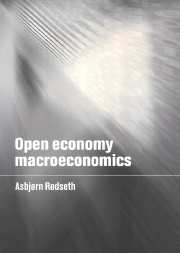10 - Exchange rate policy
Published online by Cambridge University Press: 06 July 2010
Summary
Previous chapters have shown that exchange rate flexibility can be useful in many circumstances. Still a large number of countries attempt to keep their exchange rates fixed. The present chapter discusses the choice between fixed and floating exchange rates from the perspective of a single open economy.
The choice of exchange rate regime is part of a wider question: What should the target(s) for monetary policy be? The number of targets which can be met is at most equal to the number of independent instruments available. We may think of the central bank as having two instruments: the rate of interest (z) and the foreign exchange reserve (Fg). With two instruments the central bank can reach at most two independent targets. If capital mobility is perfect, one instrument (Fg) is ineffective, and it can reach just one target.
Targeting the exchange rate ties up one instrument. Traditionally it has been assumed that the foreign exchange reserve is used to keep the exchange rate fixed. An alternative is to use the interest rate, and if capital mobility is perfect that is the only option, since sterilized interventions are then ineffective.
If we drop the exchange rate target, we ‘release’ one instrument, which then becomes available for other purposes. In section 4.3 we argued that an economy needs a nominal anchor in order to tie down expectations of nominal variables. If there is no exchange rate target, it would thus seem a good idea to target another nominal variable.
- Type
- Chapter
- Information
- Open Economy Macroeconomics , pp. 323 - 352Publisher: Cambridge University PressPrint publication year: 2000



